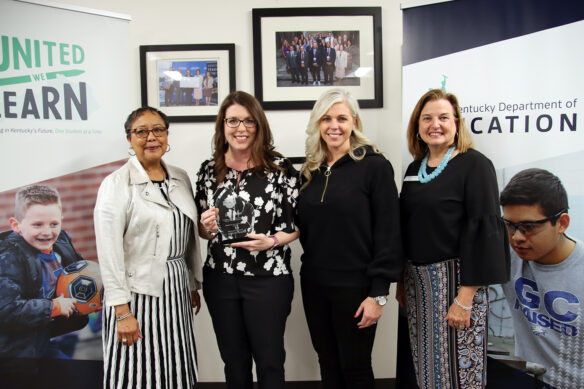
Kentucky Board of Education Chair Sharon Porter Robinson, from left, presented the 2024 Robinson Award for Diversity and Equity in Public Education to Emily Lehman, a 5th-grade educator for W.R. McNeill Elementary (Bowling Green Independent). With her at the presentation was her nominator, Sarah Wilder, and Commissioner of Education Robin Fields Kinney.
Photo by Joe Ragusa, Kentucky Department of Education, April 10, 2024
The Kentucky Board of Education (KBE) presented the 2024 Robinson Award for Diversity and Equity in Public Education to Emily Lehman, a 5th-grade educator for W.R. McNeill Elementary (Bowling Green Independent), at its April 10 meeting.
Lehman said she is “grateful and humbled” to receive the 2024 Robinson Award.
Each year, the KBE gives the Robinson Award to a Kentuckian or a Kentucky organization demonstrating extraordinary efforts and contributions in the area of educational diversity and equity. The criteria for receiving this award includes, but is not limited to:
- Successful efforts in closing socioeconomic and/or racial achievement gaps; and
- Significantly improving student learning, student achievement or other measured outcomes among students of color or economically-disadvantaged students.
“I accept it not only for myself, but all who have worked together to engage in this important effort,” Lehman said. “Working alongside dedicated parents to establish a stronger connection to math standards and collaborating with dedicated community members to provide mentorship to my students has been an honor.”
Interim Commissioner of Education Robin Fields Kinney noted that Lehman’s dedication to equity in education and her innovative new programs have left a lasting impact on her students.
“It was an honor for the Kentucky Board of Education to be able to recognize her efforts,” she said.
Sarah Wilder, Lehman’s nominator, described her as embracing education “not as a profession but as a passion.”
“Her diligent work to unveil and address inequity has led to reform and innovative new programs, inspiring African American families in new and engaging ways,” said Wilder, a 5th-grade social studies teacher at W.R. McNeill Elementary and the Gilder Lehrman Institute of American History 2023 Kentucky History Teacher of the Year.
“Emily Lehman approaches education with (the) reflection and creativity that creates greater student learning and positive change,” Wilder said. “She is a worthy recipient of your award.”
Lehman researches and collaborates with academics as a member of both the Kentucky Center for Mathematics and the National Council for Teachers of Mathematics. In 2020, after hearing of research about inequity in mathematics instruction, Lehman led her mathematics team in academic conversations on how to teach about prejudice and its effect on the American education system.
“A year later, this global trend became personal as the population of Lehman’s school became increasingly diverse and subgroup populations were large enough to identify trends as compared to the whole group,” said Wilder. “Both national data and local school data showed consistent discrepancies in math performance of African Americans compared to other subgroups or (the) collective whole.”
Wilder said changes Lehman made in her teaching practice were met with such “success and positive response” that she designed Mathletes to be a three-layered initiative supporting and celebrating mathematics among Black families at W.R. McNeill Elementary. The three levels of the initiative are:
- First level: Family Game Nights empower families to connect with current standards and explore math games. Families are challenged to play weekly, turning in raffle tickets for prizes provided by community partners. Parents reported being inspired by the mindset transformation witnessed as their families embraced math as both fun and fundamental.
- Second level: Students are put into small group teams and meet with community mentors bi-weekly, setting and celebrating goals for learning.
- Third level: Grades 4 and 5 Mathletes celebrate Black STEM contributors, creating presentations that include themselves as future Black STEM contributors and connecting to the Mathlete norm that their future is math dependent. These students become math coaches for grade K-3 Black students, playing math games and sharing STEM contributors to cultivate a positive mathematical mindset in the younger population of the school.
Through multiple data modes like parent feedback, math autobiography pre/post year and diagnostic testing, the school saw “the Mathletes program creating the desired math mastery improvement” as well as “facilitating a paradigm shift of students embracing math and taking pride in their part of math legacy,” said Wilder.
Mathletes celebrates “the rich history of many Black mathematicians who have made significant contributions to the field,” she said.
“Mathletes embraces being a mathematician, seeing math as fundamental.”
With the knowledge that every students’ future is math dependent, Wilder said Mathletes’ families support math skills at home by playing math games, supporting math skills and embracing authentic applications of math in real life.
“Black individuals have made profound and indelible contributions to the field of mathematics and my students celebrate being a part of that lasting legacy,” said Lehman. “It is a profound privilege to lead this important work at my school and I am truly grateful for the positive impact I see developing.
“Diversity is something to be celebrated and is a poignant reminder of the brilliance and resilience of our community. I am proud to be a teacher in the Commonwealth of Kentucky, where we prioritize equity in public education as a continuous mission.”
The Robinson award is named for Samuel Robinson, a member of the KBE from 1991-2004 who made diversity and equity in public education his life’s work.
A noted educator and civil rights leader, Robinson began his career in Kentucky in Louisville in 1960. His diverse background in public education includes everything from serving as principal at Shawnee High School (now the Academy at Shawnee) to president of the Lincoln Foundation. Robinson also was a well-known community figure as Louisville navigated the Civil Rights era.




Leave A Comment